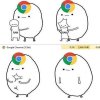100% Agree. It's like all the people on here think it makes more sense to have a 1 ft x 1ft desk, then just put everything away in a filing cabinet if your not using it that exact second. Done reading the letter from your friend? In the filing cabinet. Pull out the address book. Oops, I forgot what his address was. Put the address book in the filing cabinet, and pull out the later. Crap, now I can't write it down... (I seriously have watched people like ahem, my parents, use a computer this way. It makes NO sense whatsoever. Just leave the thing open for crying out loud until you're done with it!)
I have 16 GB RAM on my workstation at the office and at home and it is usually enough, but there I times I hit the limit there as well. Specifically running 2-3 Visual Studio instances in debug mode, 20 tabs in Chrome, Fiddler, SSMS, LINQPad, a copy of our production application software, Microsoft Lync, Spotify, and Eclipse. Why should I close each one as I open the next one when I'm switching back and forth between them all very often throughout the day?
Apparently these other people that disagree haven't discovered what high productivity looks like

